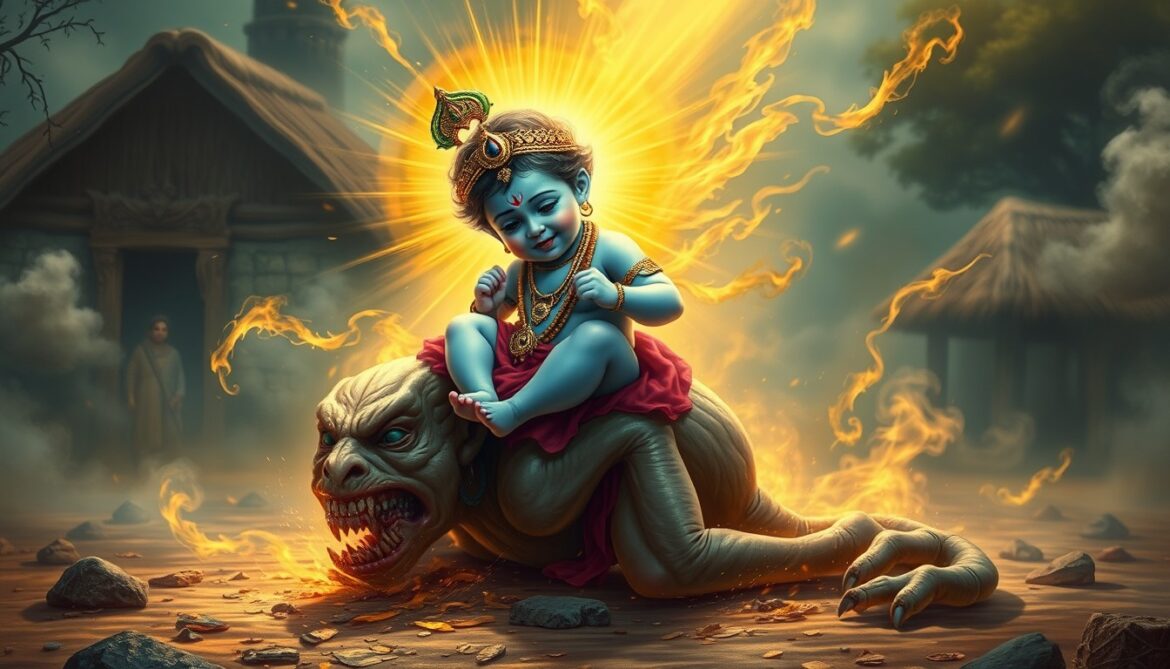In Hindu mythology, Krishna’s battle with Putana is a key story. It shows how divine power can protect us. This tale is about good vs. evil in Krishna’s early days.
King Kamsa wanted to kill all babies born to Devaki and Vasudeva. He used Putana, a demoness, to do this. She was sent to kill babies in many kingdoms.
Putana looked like a beautiful woman to trick people in Gokul. She wanted to kill Krishna. Her plan was to seem like a goddess to fool the villagers.
When Putana came to Krishna, she offered poisoned milk. But Krishna was not just any baby. He had special powers. He took Putana’s life force instead of dying.
This event was a big change. It showed Krishna’s amazing powers. It also prepared him for his battles against evil.
The Mythological Background of Putana
https://www.youtube.com/watch?v=HAXtiseTwzU&pp=ygUOI3NyaWtyaXNrYWhhbmk%3D
In Hindu mythology, the story of Krishna and Putana is very important. It shows how a god can save the world. Putana is a complex character, full of fear and motherly love.
Putana’s story is very scary. She was a demoness, or rakshasi. She had many meanings:
- A child-killer for demon king Kamsa
- A shape-shifter with scary looks
- A danger to babies
Origins of the Demoness
The Bhagavata Purana tells us about Putana. She was black, had big teeth, and a huge mouth. She wanted to kill babies to help Kamsa.
Putana’s Role in Krishna’s Early Life
In the story of Krishna and Putana, she plays a big part. She looked like a nice Brahmin woman. She tried to poison Krishna with her milk. This was a test of God’s protection.
Significance in Hindu Mythology
The story of Putana is more than just a fight. It shows the battle between good and bad. It also shows how a mother can sacrifice for her child. Krishna’s victory made Putana a symbol of sacrifice.
- Represents cosmic balance
- Illustrates divine intervention
- Demonstrates the triumph of innocence
Putana’s story teaches us about good intentions and change. It shows how divine love can win over evil.
The Encounter Between Krishna and Putana

The Lord Krishna Putana battle is a key moment in divine stories. It shows the baby god’s amazing power against evil. This famous fight happened in the quiet village of Gokul, where a bad plan was about to start.
Putana’s Cunning Arrival
Putana came to Gokul looking like a beautiful woman. But she was really a demon who killed children. She went to Krishna’s crib with a plan to kill the baby with her poisoned milk.
Krishna’s Divine Response
The battle between Krishna and Putana was very important. Krishna knew Putana was evil. When she offered her milk, Krishna sucked it with great force. This drained her life and poison at the same time.
- Putana’s body extended up to twelve miles after her death
- The sound of her falling shocked everyone present
- Her transformation revealed her true demonic form
The Dramatic Transformation
As Krishna’s power grew, Putana’s huge body fell. The villagers saw a huge demoness crash down. Her defeat showed the power of good over evil.
The story of Krishna and Putana is a strong sign of the baby god’s special powers. It’s a key part of Hindu myths that inspires people all over the world.
The Aftermath of Putana’s Demise
The Lord Krishna Putana killing event changed Gokula’s spiritual scene. It showed deep meanings beyond just a fight. When Krishna killed Putana, her huge body hit the fields, causing big damage and cosmic shakes.
The story of Krishna and Putana meant a lot to the villagers. It showed that even bad guys can find peace. Krishna’s kindness helped Putana find her way, showing grace to all.
People saw a baby god beat a big enemy. This made Krishna famous. It showed his power and wisdom.
Experts say this story is about protection and being right. It teaches that true power comes from inside, not just strength. Putana’s defeat teaches us to fight our own demons with spiritual strength.
Today, Hindu thinkers look at this story deeply. They see it as a lesson in change, kindness, and finding peace. It teaches us about the power of divine help and growing spiritually, no matter where we start.

